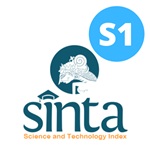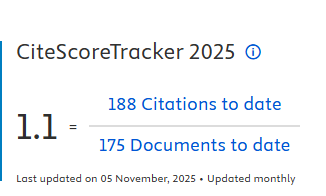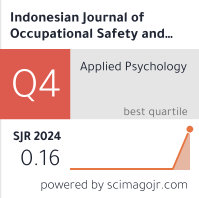The Correlation between Discipline and Work Productivity at PT. Bina Megah Indowood
Downloads
Introduction: Productive human resources are able to complete the given tasks and responsibilities well. Discipline is the mental attitude at work needed to achieve productivity. Discipline at work creates smooth operational activities of the company. PT. Bina Megah Indowood is a manufacturing company that provides solid wood flooring with various thickness. The present study analyses¬ the correlation between individual characteristics, discipline, and work productivity among molding machine workers of PT. Bina Megah Indowood. Methods: This study was an observational analytic study with a cross sectional approach. Variables in this study were work discipline as an independent variable and productivity as a dependent variable. The population in this study were 58 workers in the molding section, 50 of whom were taken as samples. The sampling technique used was a simple random sampling. Morover, the two types of data used in this study were primary data obtained from questionnaires and secondary data obtained from the company profiles and a summary of production results every month. The technique of data analysis data was a Spearman correlation test. Results: Most workers in the molding machine production unit of PT. Bina Megah Indowood have moderate discipline and moderate work productivity. There is a correlation between discipline and work productivity with Ï-value = 0.020. The contingency coefficient between discipline and work productivity is 0.328, which means the correlation is weak. Conclusion: Higher work productivity is followed higher level of discipline. Meanwhile, individual characteristics have no correlation with work productivity because the distribution resultof individual characteristics is only dominant in one category.
Keywords: discipline, individual characteristics, work productivity
Agustini, F. (2011) Manajemen Sumber Daya Manusia Lanjutan. Medan: Medanetera.
Asian Productivity Organization (2018) APO Productivitity Databook 2018.
Badan Kependudukan dan Keluarga Berencana Nasional (2014) Kerjasama Pendidikan Kependudukan Jalur Non Formal. Jakarta: Badan Kependudukan dan Keluarga Berencana Nasional .
Farikha, R. R. P. and Ardyanto, D. (2017) ‘Hubungan Status Gizi, Karakteristik Individu Dengan Produktivitas Pekerja Sorting Dan Packing', The Indonesian Journal of Occupational Safety and Health, 5(1), pp. 71-80.
Firdaus, J. (2019) ‘Analisis Disiplin, Budaya Kerja dan Motivasi Terhadap Produktivitas Kerja Karyawan di PT. Adi Satria Abadi Bantul', Jurnal EBBANK, 10(2), pp. 49–58.
Hasibuan, M. S. P. (2010) Manajemen Sumber Daya Manusia. Jakarta: PT. Bumi Aksara.
Iswandi Idris, Helviana Hasibuan, Doni Efriza, R. A. S. (2017) ‘IBM Peningkatan Produktivitas Kelompok Usaha Roti "Nenot-Nenot” Kelurahan Suka Ramai Medan', Jurnal Teknovasi, 4(1), pp. 51–58.
Izzah, N. and Ardiani, I. (2016) ‘Produktivitas Kerja Karyawan Pada Mechanical Division Pt Mulia Makmur Elektrikatama', Jurnal Administrasi Bisnis, 13(02), pp. 210–222.
Jamaludin, A. (2018) ‘Hubungan Disiplin Kerja dan Motivasi terhadap Budaya Kerja pada CV. Panca Mandiri Jaya Karawang' Jurnal Manajemen & Bisnis Kreatif, 3(2), pp. 224–237.
Laminia, D. (2018) ‘Hubungan Motivasi Dan Masa Kerja Dengan Produktivitas Pekerja Di Home Industry', The Indonesian Journal of Occupational Safety and Health, 7(2), pp. 241–248.
Liyas, J. N. and Primadi, R. (2017) ‘Pengaruh disiplin kerja terhadap kinerja karyawan pada bank perkreditan rakyat', Al Masraf: Jurnal Lembaga Keuangan dan Perbankan, 2(1), pp. 1–10.
Prabowo, B. P. S. (2016) ‘Pengaruh Tingkat Pendidikan Dan Penempatan Terhadap Produktivitas Kerja Karyawan Pada PT. Industri Kapal Indonesia, Bitung', Jurnal Berkala Ilmiah Efisiensi, 16(4), pp. 738–751.
Purbaya, H. and Paskarini, I. (2020) ‘Correlation of Nutritional Status and Subjective Fatigue with the Productivity of Labourers Hubungan Status Gizi dan Kelelahan Subyektif dengan Produktivitas pada Pekerja Kuli', The Indonesian Journal of Occupational Safety and Health, 9(1), pp. 1–11.
Sandi, D. P. (2016) ‘Analisis Hubungan Kompensasi Dan Motivasi Terhadap Produktivitas Kerja Karyawan Bagian Admin Di PT Dynamic Succes Globalindo', Fundamental Management Journal, :1(S) No.1(1), pp. 80–89.
Sani, N. (2019) ‘Hubungan Antara Disiplin Kerja, Lingkungan Kerja Dan Etos Kerja Dengan Produktivitas Kerja Perawat Di Ruang Rawat Inap Rs Pertamina Bintang Amin Bandar Lampung Tahun 2018', Journal Ilmu Kedokteran dan Kesehatan, 6(3), pp. 186–193.
Sedarmayanti (2011) Tata Kerja dan Produktivitas Kerja. Edited by M. Maju. Bandung: CV. Mandar Maju.
Semmaila, B. (2017) ‘Karakteristik Individu, Sosial Ekonomi, Budaya Dan Kesehatan Terhadap Produktivitas Kerja Karyawan Pada Industri Kecil Di Kota Makassar', EKUITAS (Jurnal Ekonomi dan Keuangan), 12(4), p. 549-567.
Siagian, S. P. (2004) Teori Motivasi dan Aplikasinya. Jakarta: Bina Aksara.
Sinaga, L. R. (2018) ‘Hubungan Disiplin Kerja Terhadap Produktivitas Kerja Pegawai Dan Guru Pada SMK SW. PGRI Kabupaten Toba Samosir', Tapanuli Journals, 1(1), pp. 121–126.
Siswadi, Y. (2016) ‘Pengaruh Pelatihan dan Disiplin Terhadap Produktivitas Kerja Karyawan Pada PT. Jasa Marga Cabang (Belmera) Medan', Jurnal Ilmiah Manajemen dan Bisnis UMSU, 17(01), pp. 124–137.
Sunarsi, D. (2018) ‘engaruh Motivasi dan Disiplin terhadap Produktivitas Kerja Karyawan pada PT. Nadi Suwarna Bumi', Jurnal SeMaRaK, 1(1), pp. 66–82.
Syafrina, N. (2017) ‘Pengaruh Disiplin Kerja Terhadap Kinerja Karyawan', Eko dan Bisnis (Riau Economics and Business Reviewe), 8(4), pp. 1–12.
Utomo, S. B. (2018) ‘Pengaruh Pendidikan dan Pelatihan Tenaga Kerja terhadap Produktivitas Kerja Karyawan Bagian Kasir pada Toserba Yogya di Kabupaten Majalengka', Syntax Literate: Jurnal Ilmiah Indnesia, 53(9), pp. 1689–1699.
Veitzhal, R. (2011) Manajemen Sumber Daya Manusia Untuk Perusahaan. Jakarta: PT. Raja Grafindo Persada Jakarta.
Verawati, L. (2017) ‘Hubungan Tingkat Kelelahan Subjektif dengan Produktivitas pada Tenaga Kerja Bagian Pengemasan di CV Sumber Barokah', The Indonesian Journal of Occupational Safety and Health, 5(1), p. 51.
World Economic Forum (2018) Index Global Competitiveness. Geneva: World Economic Forum.

In order to be accepted and published by The Indonesian Journal of Occupational Safety and Health, Author(s) who submit an article should complete all the review process. The copyright of received articles assigned to the The Indonesian Journal of Occupational Safety and Health and Department of Safety and Health, Universitas Airlangga as publishers of the journal. The intended copyright includes the rights to publish articles in various forms (including reprints).
The Editorial Team of The Indonesian Journal Of Occupational Safety and Health and Department of Safety and Health strive to ensure that no errors occur in the articles that have been published, both data errors and statements in the article.
Users of this website will be licensed to use materials from this website following the Creative Commons Attribution-NonCommercial-ShareAlike 4.0 International License. No fees charged. Please use the materials accordingly.
------------------------------------------------------------------------------------------------------------------------------------------------------------------------------------------
Attribution ” You must give appropriate credit, provide a link to the license, and indicate if changes were made. You may do so in any reasonable manner, but not in any way that suggests the licensor endorses you or your use.
NonCommercial ” You may not use the material for commercial purposes.
ShareAlike ” If you remix, transform, or build upon the material, you must distribute your contributions under the same license as the original.







 How to Submit Articles in OJS
How to Submit Articles in OJS

























